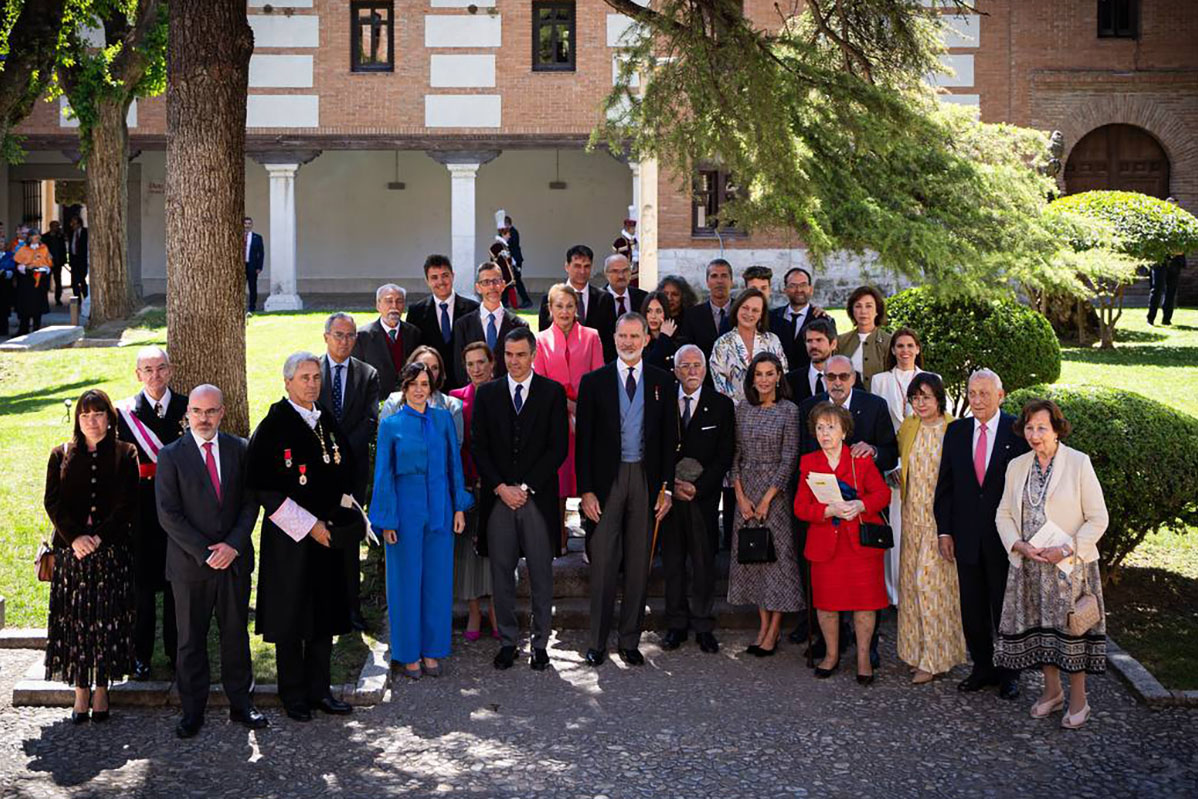 Family photo from the 2023 Cervantes Prize presentation ceremony
Family photo from the 2023 Cervantes Prize presentation ceremony
The President of the Government of Spain, Pedro Sánchez, and various political and cultural personalities were present at the ceremony. The award ceremony was attended by the winning author and the Minister for Culture, Ernest Urtasun.
The jury, which met on 7 November, awarded the prize to Luis Mateo Díez "as one of the great storytellers of the Spanish language, heir to the spirit of Cervantes, a writer despite all adversity, a creator of imaginary worlds and territories". The report said that "with a prose, shrewdness and style that make him singular in the highest literary consideration, Luis Mateo Díez surprises and consistently presents new challenges with which he transcends the realm of fantasy, acquiring reality in readers, who appropriate his creative universe".
It went on to state that "in his creations, the author's expertise and unquestionable mastery of language stand out, manifesting in a writing that masterfully mixes the cultured and the popular. A singular, demanding, highly original style where expressionist, parodic or grotesque humour prevails as the best way to relativise the prose, and which entails a lucid and ambiguous perspective that allows us to glimpse the complexity of the human condition".
Cervantes Prize
The Cervantes Prize was awarded for the first time in 1976 to Jorge Guillén, and since then it has been awarded to a total of 48 authors. In 1979, the prize was awarded ex aequo to Jorge Luis Borges and Gerardo Diego. Since then, the order of convocation stipulates that the prize may not be divided, declared void or awarded posthumously.
The awarding of this prize, endowed with €125,000, is an annual public testimony of admiration for the figure of a writer who, through their work as a whole, has contributed to enriching the Hispanic literary legacy.
The Cervantes Prize may be awarded to any author whose literary work is written entirely, or mostly, in Spanish. Candidates for the Prize are put forward by the Academies of the Spanish Language, authors who have won prizes in previous editions, institutions which, due to their nature, objectives or content, are linked to literature in the Spanish language, and by the members of the Jury.
Luis Mateo Díez
Luis Mateo Díez (León, 1942) is one of the most prolific writers on the Spanish literary scene. In addition to his two books of poetry, his narrative, autobiographical and essayistic work has won important narrative prizes. He is twice winner of the Premio de la Crítica and Premio Nacional de Narrativa, Premio Francisco Umbral and Premio Café Gijón, among others. In 2020 he was awarded the Premio Nacional de las Letras Españolas.
Among his most outstanding works are 'Las estaciones provinciales' (1982), 'La fuente de la edad' (1986), the collection of stories in 'Brasas de agosto', 'Las horas completas' (1990), 'El expediente del náufrago' (1992), 'El espíritu del páramo' (1996), the autobiographical 'Días del desván' (1997), the essay 'El porvenir de la ficción' (1999), the short stories 'Las lecciones de las cosas' (Miguel Delibes Prize 2004), and the more than eighty stories collected in 'Vicisitudes' (2018). His latest novels are 'The Sidereal Elders' (2020) and 'My Pet Crimes' (2022).
Jury
The jury, which met on 7 November, was chaired by Santiago Muñoz Machado, representative of the Royal Spanish Academy, and María José Gálvez, Director General of Books, Comics and Reading at the Ministry of Culture, acted as vice-president.
Also on the jury were members Luisa Campuzano Sentí, for the Cuban Academy of Language; Antonio Lorente Medina, for the Conference of Rectors of Spanish Universities (CRUE); Laurette Godinas, for the Union of Latin American Universities (UDUAL); Javier Rioyo Jambrina, for the Cervantes Institute; Raquel Lanseros Sánchez, for the Ministry of Culture and Sport; María Jesús Chao Álvarez de Sierra, for the Federation of Associations of Journalists of Spain (FAPE); Juan Carlos Camaño, for the Latin American Federation of Journalists (FELAP); Madeline Sutherland-Meier, for the International Association of Hispanists; Cristina Peri Rossi, writer laureate of the 2021 edition; and Rafael José Cadenas González, writer laureate of the 2022 edition.
History of award-winning authors
- 1976 Jorge Guillén
- 1977 Alejo Carpentier
- 1978 Dámaso Alonso
- 1979 Jorge Luis Borges
- Gerardo Diego
- 1980 Juan Carlos Onetti
- 1981 Octavio Paz
- 1982 Luis Rosales
- 1983 Rafael Alberti
- 1984 Ernesto Sábato
- 1985 Gonzalo Torrente Ballester
- 1986 Antonio Buero Vallejo
- 1987 Carlos Fuentes
- 1988 María Zambrano
- 1989 Augusto Roa Bastos
- 1990 Adolfo Bioy Casares
- 1991 Francisco Ayala
- 1992 Dulce María Loynaz
- 1993 Miguel Delibes
- 1994 Mario Vargas Llosa
- 1995 Camilo José Cela
- 1996 José García Nieto
- 1997 Guillermo Cabrera Infante
- 1998 José Hierro
- 1999 Jorge Edwards
- 2000 Francisco Umbral
- 2001 Álvaro Mutis
- 2002 José Jiménez Lozano
- 2003 Gonzalo Rojas
- 2004 Rafael Sánchez Ferlosio
- 2005 Sergio Pitol
- 2006 Antonio Gamoneda
- 2007 Juan Gelman
- 2008 Juan Marsé
- 2009 José Emilio Pacheco
- 2010 Ana María Matute
- 2011 Nicanor Parra
- 2012 José Manuel Caballero Bonald
- 2013 Elena Poniatowska
- 2014 Juan Goytisolo
- 2015 Fernando del Paso
- 2016 Eduardo Mendoza
- 2017 Sergio Ramírez
- 2018 Ida Vitale
- 2019 Joan Margarit
- 2020 Francisco Brines
- 2021 Cristina Peri Rossi
- 2022 Rafael Cadenas
- 2023 Luis Mateo Díez
Non official translation




